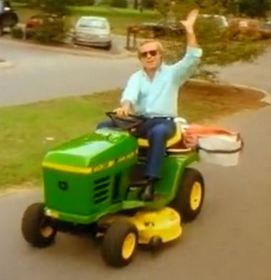 Listen up, brothers and sisters—what follows here is the only sermon I know how to give:
Listen up, brothers and sisters—what follows here is the only sermon I know how to give:
Sometime in the late summer of 1975, when I was seven, my father took the blade off a John Deere riding mower, and in a moment of whimsical decision, drove out of the yard, and onto the asphalt street where we lived. He rounded the corner, went a block, then proceeded out onto Grand Avenue, the wide main boulevard that cut through town, and kept on going.
He was wearing a sky blue zip-up workman’s jumpsuit. The cancer that would kill him in a year was already branching through his lungs. I can imagine him grinning and waving at the cars passing by, though at the time I was inside the house and didn’t see a thing.
I was right there, though, when the telephone rang and my mother answered it, to get an earful from a neighbor who was at once both amused and annoyed: “Miz Langston, do you know what your husband is doing?”
I remember my mother laughing, but I also remember being cognizant of the neighbor’s implication, however slight, that my father had crossed some kind of social boundary and had to be brought back into line.
There are several points I’d like to extrapolate from that story, from the simply temperamental to the aesthetic to the final, deadly serious question of how we live our faith before others—IF we do so, ever, at all. (And I’m speaking as a Christian here, but what I mean would, in the broader sense, apply to just about anyone.)
What I love about that story is what it says about my father’s sense of humor, of course, but also his sense of risk, his refusal to be measured by others. And how driving a Kermit-green riding mower through the middle of town was not some act of rebellion, some social point, but rather an expression of joy.
We are short on joy these days, I think, though we are not lacking in our passion for making social points.
To wit, here are two recent examples:
One: I was on an email thread (these are my churchy people) in which a parent said that she avoided letting her children be around some neighbors, “because they had voted for Obama.”
Two: I was sharing a meal with another set of intimates when I remarked casually that I had a friend (actually more than one) who worked for a libertarian nonprofit that receives funding from the famous Koch Brothers. And even though our entire table was composed of folks who would have considered themselves nonjudgmental and “open-minded,” there rose over the table an instant and audible hiss.
These kinds of reactions may just be the result of living in the DMV (District, Maryland, Virginia) bubble, but I doubt it. If anything, I suspect that out in the “real America” we locals are constantly reminded we do NOT live in, the divisions are even sharper—that it is possible to go around never encountering anyone with a different set of a priori assumptions or foundational narratives.
And increasingly, this is as much a reflection of race, class, or socioeconomics as it is values or religion.
It always blows my mind to see how progressives of a certain upper-middle-class stripe in Washington (other than in my very eclectic neighborhood, which I write about here) almost invariably know very little about the culture of African-Americans—not even the very affluent, professional suburban cohort that’s such a presence in Prince George’s County, Maryland where I live.
There’s a dismissiveness that gets shoveled around this city in conversational references to what happens over in PG. And that even relates to the older working-class Catholic white population of Prince George’s, from back in the day. There are students in Northwest D.C. private schools more comfortable devising irrigation systems for Lesotho than, say, driving on Branch Avenue out of town.
But this is not solely a problem of the DMV, but of all kinds of fragments of the culture: It strikes me that mainstream Episcopalians, Reform Jews, and Sunday-morning-yoga-studio-attending Nones have a lot more in common with one another than the Episcopalians do with Southern Baptists. Time was, it was possible, at least in the South, to meet a working-class Episcopalian, or a country club Southern Baptist. I love these kinds of walking cultural contradictions—and I haven’t seen one in years.
“Why are you so worried about people from different backgrounds having to be around one another? How come you are so stuck on that?” one of my brothers once asked me. Wasn’t it natural for people to want to be around the people who are like them?
Yes, of course. And yet to shrink into group-identity politics poses a danger—for everyone, I think, but especially so for those of us who call ourselves Christians: How easy it is, then, to miss the images of God, spread out so flagrantly and unexpectedly through the faces of the world—the ones we do not bother to know, and see.
And that is where the image of my father on the riding mower comes back to me: Not caring what anyone thought, having overcome the thought that other people might think him crazy.
Having opened himself to possibility, possibility opened itself to him. And on down, through the decades, to me.
To be continued tomorrow.
A native of Yazoo City, Mississippi, Caroline Langston is a convert to the Eastern Orthodox Church. She is a widely published writer and essayist, a winner of the Pushcart Prize, and a commentator for NPR’s “All Things Considered.”











